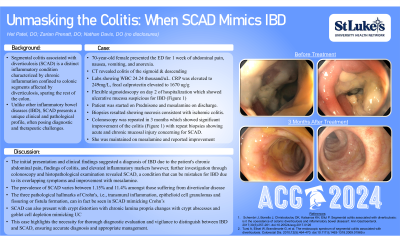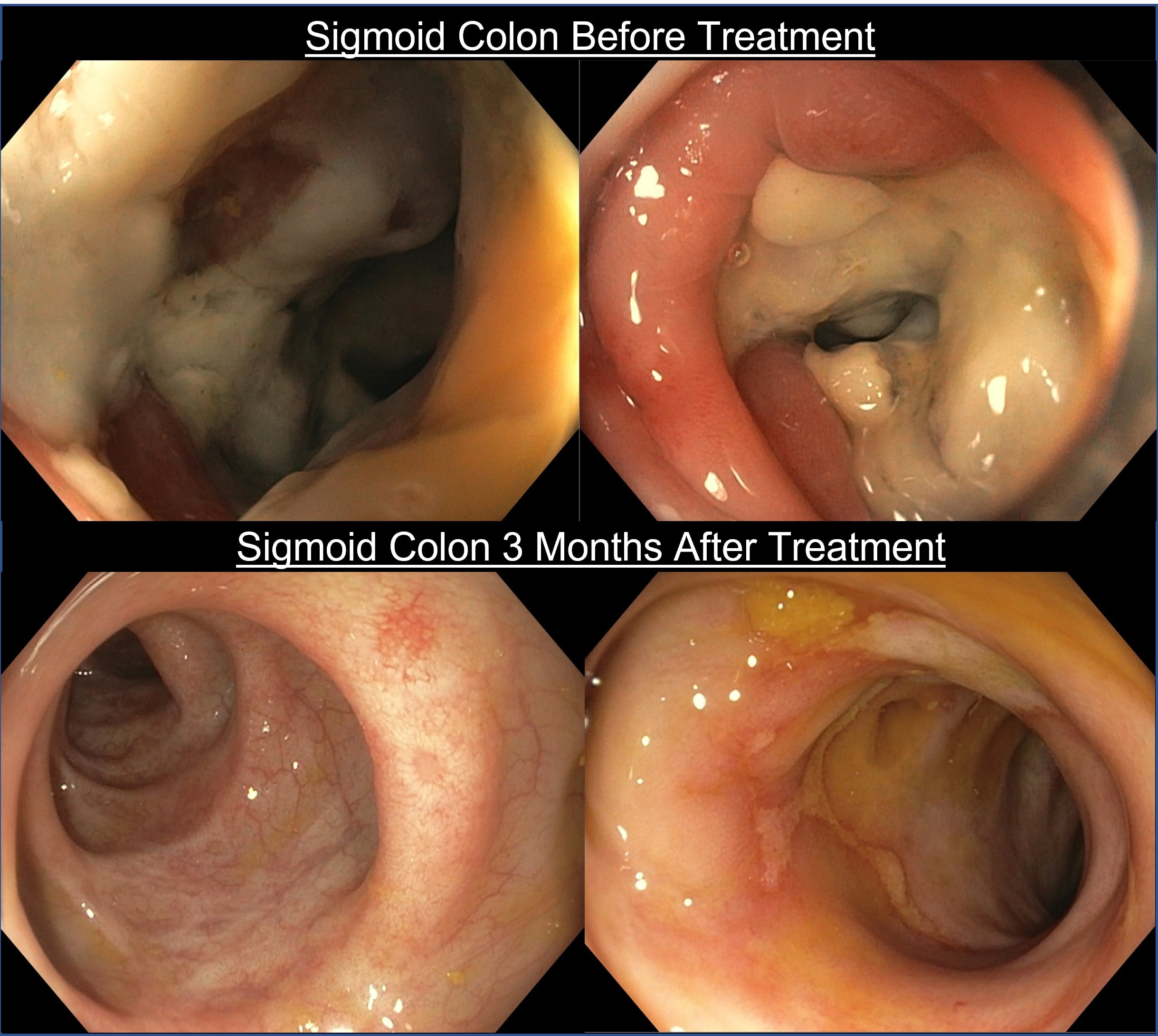Sunday Poster Session
Category: Colon
P0259 - Unmasking Colitis: When SCAD Mimics IBD
Sunday, October 27, 2024
3:30 PM - 7:00 PM ET
Location: Exhibit Hall E

Has Audio

Het Patel, DO
St. Luke's University Hospital
Bethlehem, PA
Presenting Author(s)
Het Patel, DO1, Zarian Prenatt, DO2, Nathan Davis, DO2
1St. Luke's University Hospital, Bethlehem, PA; 2Saint Luke's University Hospital, Bethlehem, PA
Introduction: Segmental colitis associated with diverticulosis (SCAD) is an inflammatory condition characterized by chronic inflammation confined to colonic segments affected by diverticulosis, sparing the rest of the colon. Though it has unique endoscopic and pathological findings, it is overall an uncommon condition mimicking other forms of colitis, requiring a high index of suspicion by the treating gastroenterologist.
Case Description/Methods: A 70-year-old female presented one week of abdominal pain, nausea, vomiting, and anorexia. Labs were remarkable for leukocytosis of 24.24 thousand/uL, CRP 249mg/L and fecal calprotectin 1670 ug/g. Lactic acid levels, C. difficile PCR, and stool enteric panel were within normal limits. CT of the abdomen with contrast revealed colitis involving the sigmoid and descending colon without pneumatosis or free air and multiple colonic diverticula. She was admitted and started on IV piperacillin/tazobactam for sepsis in setting of colitis. A flexible sigmoidoscopy was performed on day 2 of hospitalization which showed ulcerative mucosa suspicious for IBD (Figure 1) with biopsies taken. Antibiotics were stopped and the patient was started on a prednisone taper and mesalamine on discharge. Biopsies demonstrated necrosis consistent with ischemic colitis. A colonoscopy performed three months later showed significant improvement (Figure 1) though she still had residual inflammation and ulceration focused on a narrow segment of diverticula. Repeat biopsies showed acute and chronic mucosal injury confirmatory for SCAD. She was maintained on mesalamine and had eventual resolution of her symptoms and fecal calprotectin.
Discussion: In this case, the clinical presentation, imaging, laboratory and endoscopic findings suggested a differential diagnosis of IBD and ischemia. However, ongoing investigation through repeat colonoscopy and histopathological examination revealed SCAD, a condition that can be mistaken for IBD due to its overlapping symptoms and improvement with mesalamine. This case highlights the necessity for thorough diagnostic evaluation and vigilance to distinguish between IBD and SCAD, ensuring accurate diagnosis and appropriate management. Early identification of SCAD can lead to more targeted treatment strategies, potentially improving patient outcomes and avoiding unnecessary interventions.

Disclosures:
Het Patel, DO1, Zarian Prenatt, DO2, Nathan Davis, DO2. P0259 - Unmasking Colitis: When SCAD Mimics IBD, ACG 2024 Annual Scientific Meeting Abstracts. Philadelphia, PA: American College of Gastroenterology.
1St. Luke's University Hospital, Bethlehem, PA; 2Saint Luke's University Hospital, Bethlehem, PA
Introduction: Segmental colitis associated with diverticulosis (SCAD) is an inflammatory condition characterized by chronic inflammation confined to colonic segments affected by diverticulosis, sparing the rest of the colon. Though it has unique endoscopic and pathological findings, it is overall an uncommon condition mimicking other forms of colitis, requiring a high index of suspicion by the treating gastroenterologist.
Case Description/Methods: A 70-year-old female presented one week of abdominal pain, nausea, vomiting, and anorexia. Labs were remarkable for leukocytosis of 24.24 thousand/uL, CRP 249mg/L and fecal calprotectin
Discussion: In this case, the clinical presentation, imaging, laboratory and endoscopic findings suggested a differential diagnosis of IBD and ischemia. However, ongoing investigation through repeat colonoscopy and histopathological examination revealed SCAD, a condition that can be mistaken for IBD due to its overlapping symptoms and improvement with mesalamine. This case highlights the necessity for thorough diagnostic evaluation and vigilance to distinguish between IBD and SCAD, ensuring accurate diagnosis and appropriate management. Early identification of SCAD can lead to more targeted treatment strategies, potentially improving patient outcomes and avoiding unnecessary interventions.

Figure: Figure 1: Colonoscopy pictures of the sigmoid colon before and 3 months after treatment.
Disclosures:
Het Patel indicated no relevant financial relationships.
Zarian Prenatt indicated no relevant financial relationships.
Nathan Davis indicated no relevant financial relationships.
Het Patel, DO1, Zarian Prenatt, DO2, Nathan Davis, DO2. P0259 - Unmasking Colitis: When SCAD Mimics IBD, ACG 2024 Annual Scientific Meeting Abstracts. Philadelphia, PA: American College of Gastroenterology.
